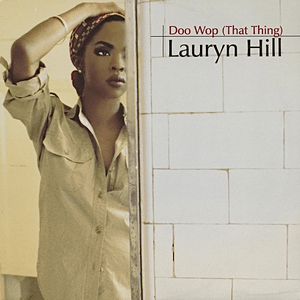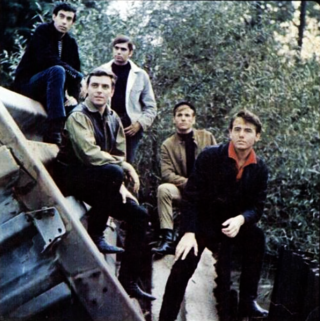
Doo-wop is a subgenre of rhythm and blues music that originated in African-American communities during the 1940s, mainly in the large cities of the United States, including New York, Philadelphia, Pittsburgh, Chicago, Baltimore, Newark, Detroit, Washington, D.C., and Los Angeles. It features vocal group harmony that carries an engaging melodic line to a simple beat with little or no instrumentation. Lyrics are simple, usually about love, sung by a lead vocal over background vocals, and often featuring, in the bridge, a melodramatically heartfelt recitative addressed to the beloved. Harmonic singing of nonsense syllables is a common characteristic of these songs. Gaining popularity in the 1950s, doo-wop was "artistically and commercially viable" until the early 1960s and continued to influence performers in other genres.

Googie architecture is a type of futurist architecture influenced by car culture, jets, the Atomic Age and the Space Age. It originated in Southern California from the Streamline Moderne architecture of the 1930s, and was popular in the United States from roughly 1945 to the early 1970s.
Why Do Fools Fall in Love may refer to:
Emotion, in psychology and common use, refers to the complex reaction of an organism to significant objects or events, with subjective, behavioral, physiological elements.
Ruben and the Jets was an American rock and roll band from Los Angeles, California. The band originated as an alias for The Mothers of Invention, Frank Zappa's band, to release Cruising with Ruben & the Jets (1968). Later, musician Rubén Guevara Jr. continued the band with his own lineup. Guevara's "Jets" recorded two albums, For Real! (1973) and Con Safos (1974).

"Doo Wop (That Thing)" is a song by American recording artist Lauryn Hill for her debut solo studio album The Miseducation of Lauryn Hill (1998). It was written and produced by Hill. The song was released as her solo debut and lead single from The Miseducation of Lauryn Hill on August 10, 1998, by Ruffhouse Records and Columbia Records. No commercial release was originally intended for the single in the US, but limited-quantity physical formats were issued two months later, on October 27.

"Gee" is a song by American R&B and Doo-wop group the Crows, released in June 1953. The song has been credited as the first rock and roll hit by a rock and roll group. It is a doo-wop song, written by William Davis and Viola Watkins, and recorded by the Crows on the independent label, Rama Records, at Beltone Studios in New York City in February 1953. It charted in April 1954, one year later. It took a year to get recognized on Your Hit Parade. It landed No.2 on the rhythm and blues chart and No. 14 on the pop chart. It was the first 1950s doo-wop record to sell over one million records. Recorded on an independent label, it was one of the first such R&B records to crossover to the wider pop market. In fact, some, including Jay Warner, consider it as the first of the "rock n' roll records".
Charade or charades may refer to:

Kenny Vance is an American singer, songwriter, and music producer who was a founding member of Jay and the Americans. His career spans from the 1950s to today, with projects ranging from starting doo-wop groups to music supervising to creating solo albums.
Still of the Night or In the Still of the Night may refer to:
"Bad Girl" is a 1959 doo-wop single by The Miracles. Issued locally on the Motown Records label, it was licensed to and issued nationally by Chess Records because the fledgling Motown Record Corporation did not, at that time, have national distribution. It was the first single released on the Motown label – all previous singles from the company were released on Motown's Tamla label. Although The Miracles had charted regionally and on the R&B charts with several earlier songs, including "Got a Job", "I Cry", "I Need a Change", and "(You Can) Depend on Me", "Bad Girl" was their first national chart hit, reaching #93 on the Billboard Hot 100. Written by Miracles lead singer Smokey Robinson and Motown Records' President and Founder Berry Gordy, "Bad Girl" is a sad, remorseful ballad about a young woman, whom Robinson, as the narrator, says "was so good at the start", but who later in the song "is breaking my heart". It is in the popular doo-wop style, as several of The Miracles' songs were during the late 1950s. The record's success, coupled with the distributor's failure to pay Gordy and The Miracles properly for its sales, prompted Robinson to urge Gordy to "go national" with it, meaning that Motown should do its own national distribution of its songs, and eliminate the middleman, to ensure that all money from sales of its records would go directly to the label.

The Wildwoods Shore Resort Historic District, or Doo Wop Motel District, is an area in The Wildwoods, New Jersey, that was home to over 300 motels built during the Doo-Wop era of the 1950s and 1960s. Officially recognized as a historic district by the State of New Jersey, it lies primarily in the municipality of Wildwood Crest, along a two-mile stretch between Atlantic and Ocean avenues, and includes areas in Wildwood and North Wildwood. The term doo-wop was coined by Cape May's Mid-Atlantic Center for the Arts in the early 1990s to describe the unique, space-age architectural style, which is also referred to as the Googie or populuxe style.

The Caribbean Motel is a historic motel located in Wildwood Crest, New Jersey. It is located in the Wildwoods Shore Resort Historic District. The motel was built in 1957 in the Doo-Wop style by Lou Morey, whose family built many of the Wildwoods' original Doo Wop motels, for original owners Dominic and Julie Rossi. It was owned by the Rossi family until the early 1990s, when they sold it to multi-billionaire Mister Bolero.

The Earth Angels are a Spanish doo-wop vocal group from Barcelona, Catalonia which performs a cappella music. On tour, they also sing on city streets. The group formed in 2007, when bass-baritone Christian Carrasco announced that he was looking for a doo-wop singer and found lead vocalist Jordi Majó.

Doo-Wops & Hooligans is the debut studio album by American singer-songwriter Bruno Mars. It was released on October 4, 2010, by Atlantic and Elektra Records and was made available to listen before its official release on September 24, 2010. After the release of the EP It's Better If You Don't Understand, Mars's writing and production team, the Smeezingtons, began working on the album with Needlz, Supa Dups and Jeff Bhasker as producers. The album title was chosen to reflect simplicity and appeal to both males and females.
"Marry You" is a song by American singer and songwriter Bruno Mars from his debut studio album, Doo-Wops & Hooligans (2010). Written and produced by the Smeezingtons, it serves as the record's sixth track and was released as a single outside of the United States. "Marry You" is a pop, doo-wop and soul song. The recording focuses on spontaneous marriage and therefore, since its release, has frequently been used as a proposal song. "Marry You" received generally positive reviews from music critics, with some complimenting its production and its reminiscence of 1960s pop style. Some criticized a perceived lack of creativity.
"Talking to the Moon" is a song by American singer-songwriter Bruno Mars from his debut studio album, Doo-Wops & Hooligans (2010). The song was first unveiled on Mars's debut extended play, It's Better If You Don't Understand (2010), as its last track. It was written by Mars, Philip Lawrence, Ari Levine, Albert Winkler, and Jeff Bhasker, while production was handled by the Smeezingtons in collaboration with Bhasker. "Talking to the Moon" is a pop and R&B power ballad about a failed relationship, solitude, and sadness. Instrumentally, the track relies on drum percussion and piano.
"Count On Me" is a song by American singer-songwriter Bruno Mars from his debut studio album, Doo-Wops & Hooligans (2010). The song was first unveiled on Mars's debut extended play, It's Better If You Don't Understand (2010). It was serviced to Australian contemporary hit radio and adult contemporary radio on November 7, 2011, as the overall sixth and final single from the album. It was composed by Mars, Philip Lawrence, and Ari Levine, under their alias, the Smeezingtons. Musically, "Count On Me" is a folk and tropical record that lyrically details the importance of friendship and conveys a positive message.
A teenager is a person between the ages of 13 and 19.







